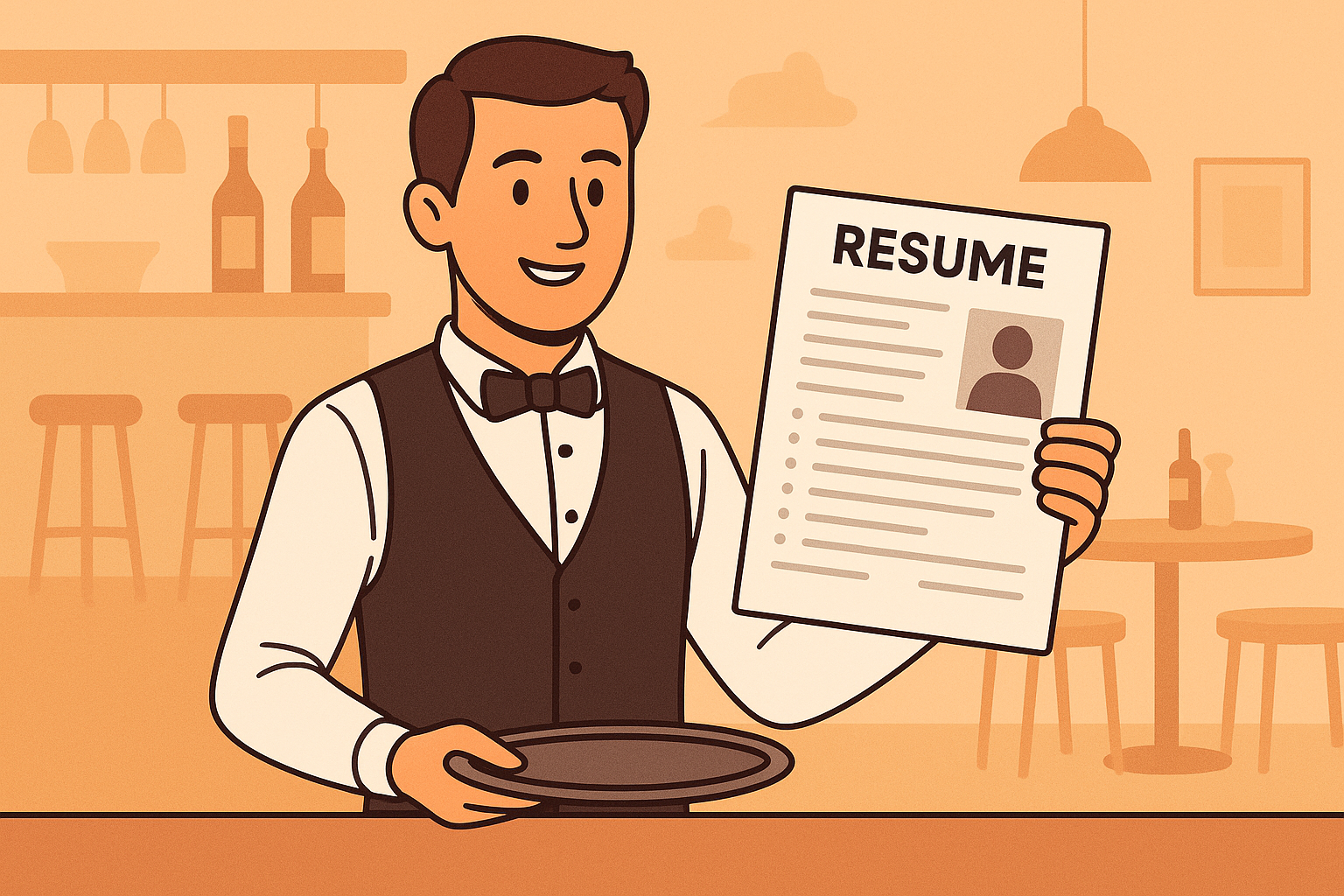A server resume highlights customer service, hospitality, and multitasking skills to succeed in restaurants, hotels, and cafes. It should emphasize experience with POS systems, food safety, teamwork, and efficiency in a fast-paced environment.x
In the bustling world of hospitality, a compelling Server resume can make all the difference in securing that coveted position. With our carefully selected resume examples for Server roles, you’ll find inspiration to showcase your unique skills and experiences, ensuring you catch the eye of hiring managers. Whether you’re a seasoned professional or just starting out, our guide will empower you to create a standout resume that opens doors to new opportunities.
Server Resume Examples – Free Download
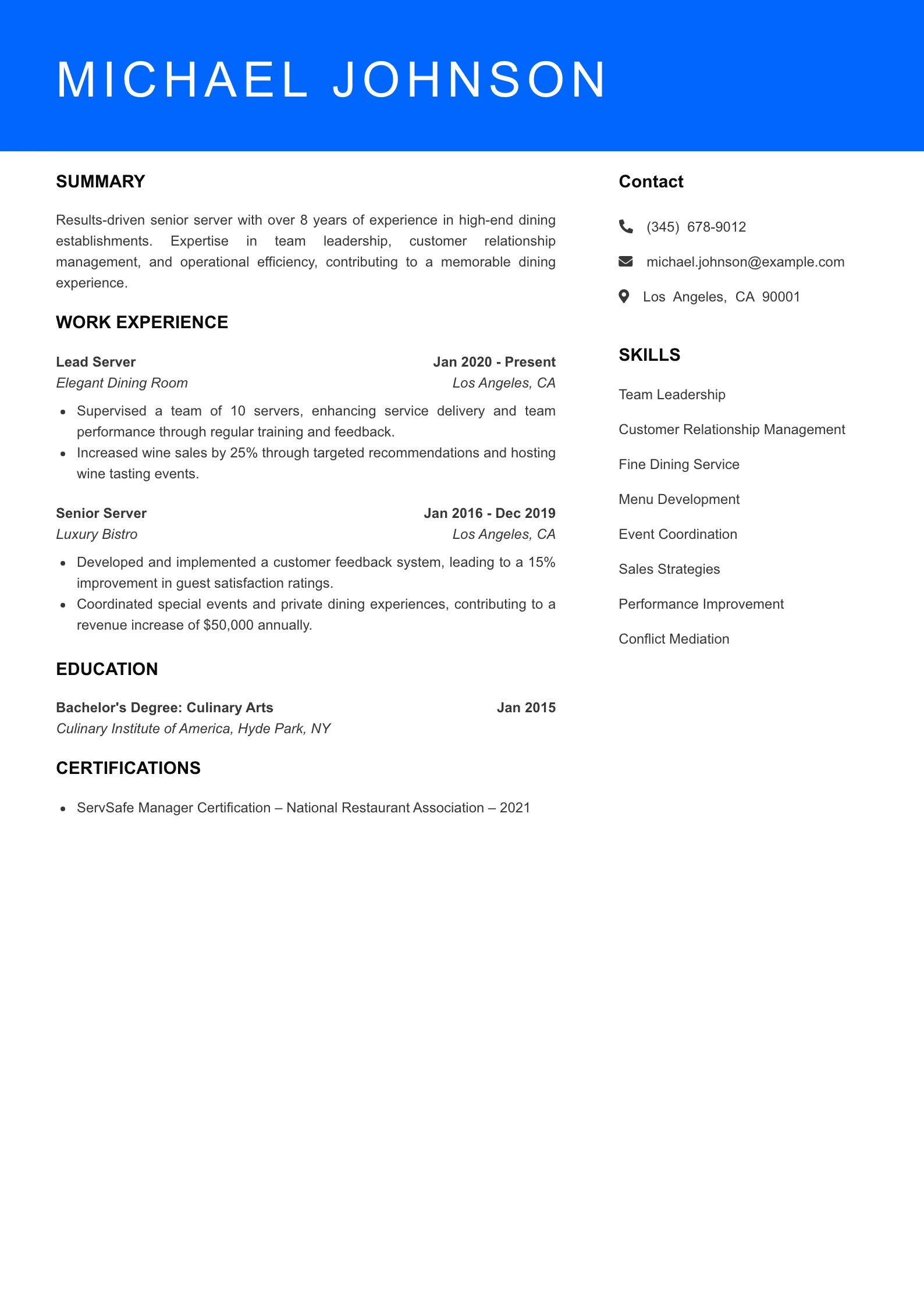
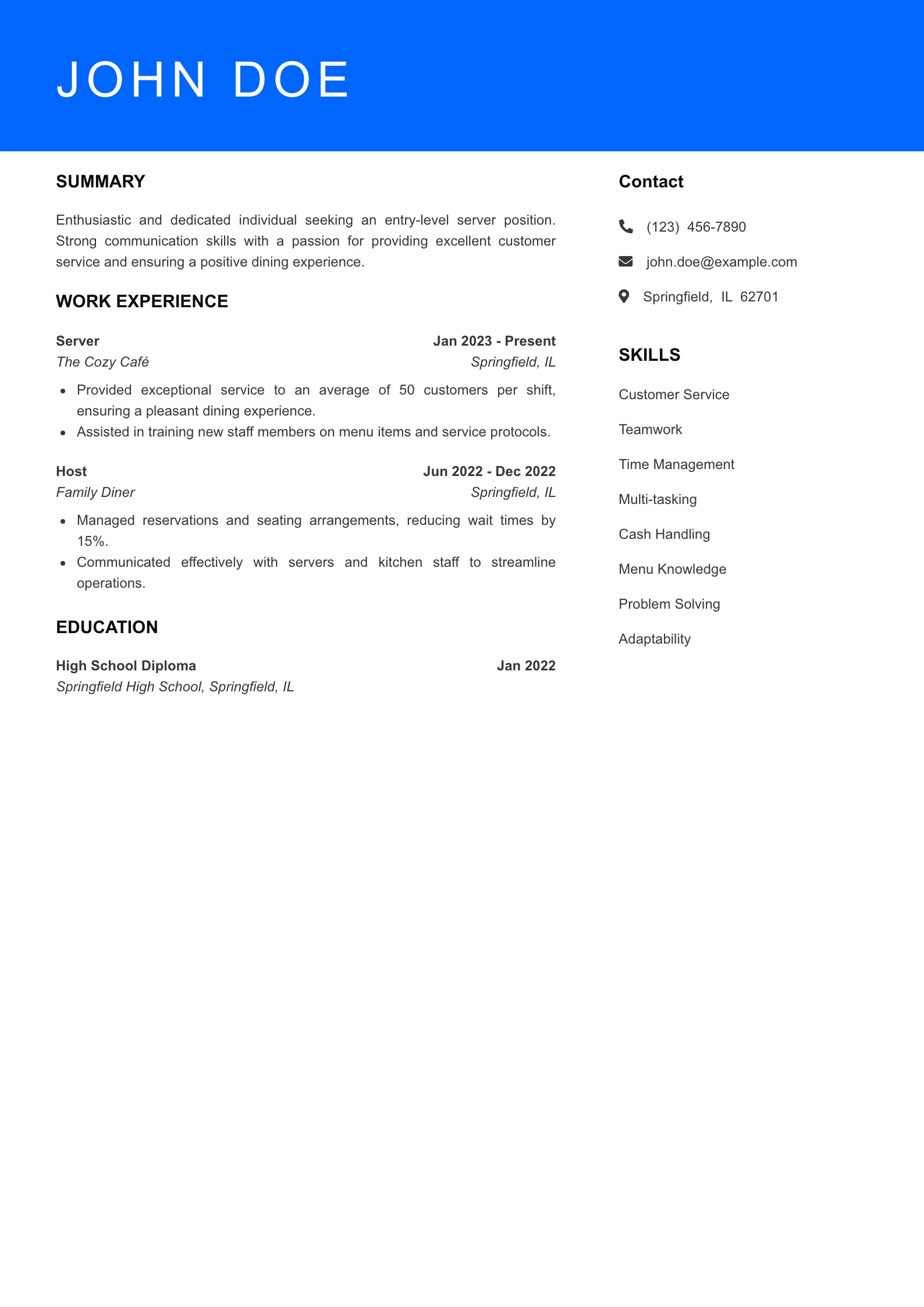
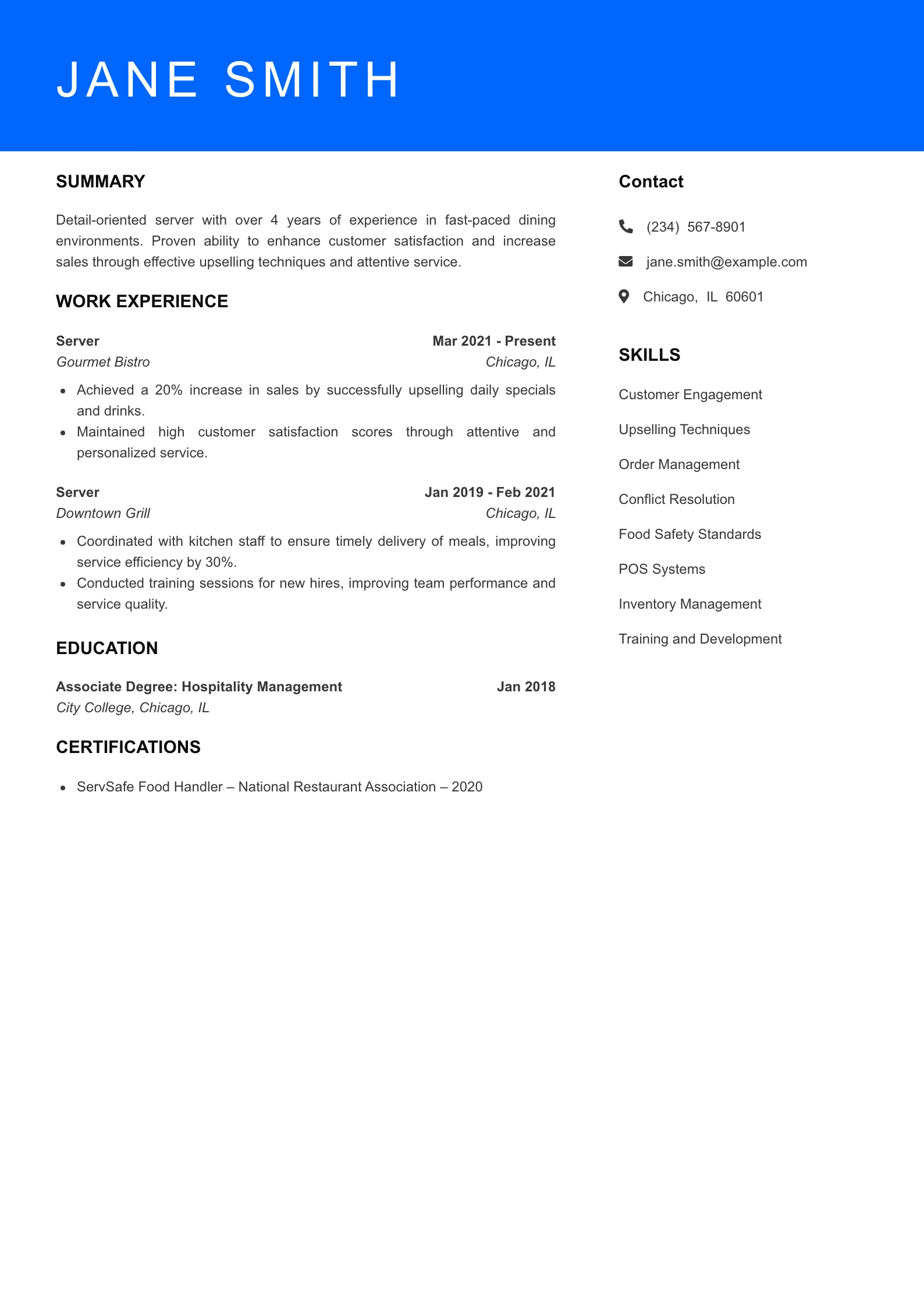

Server Resume Examples
Entry Level Server Resume Example
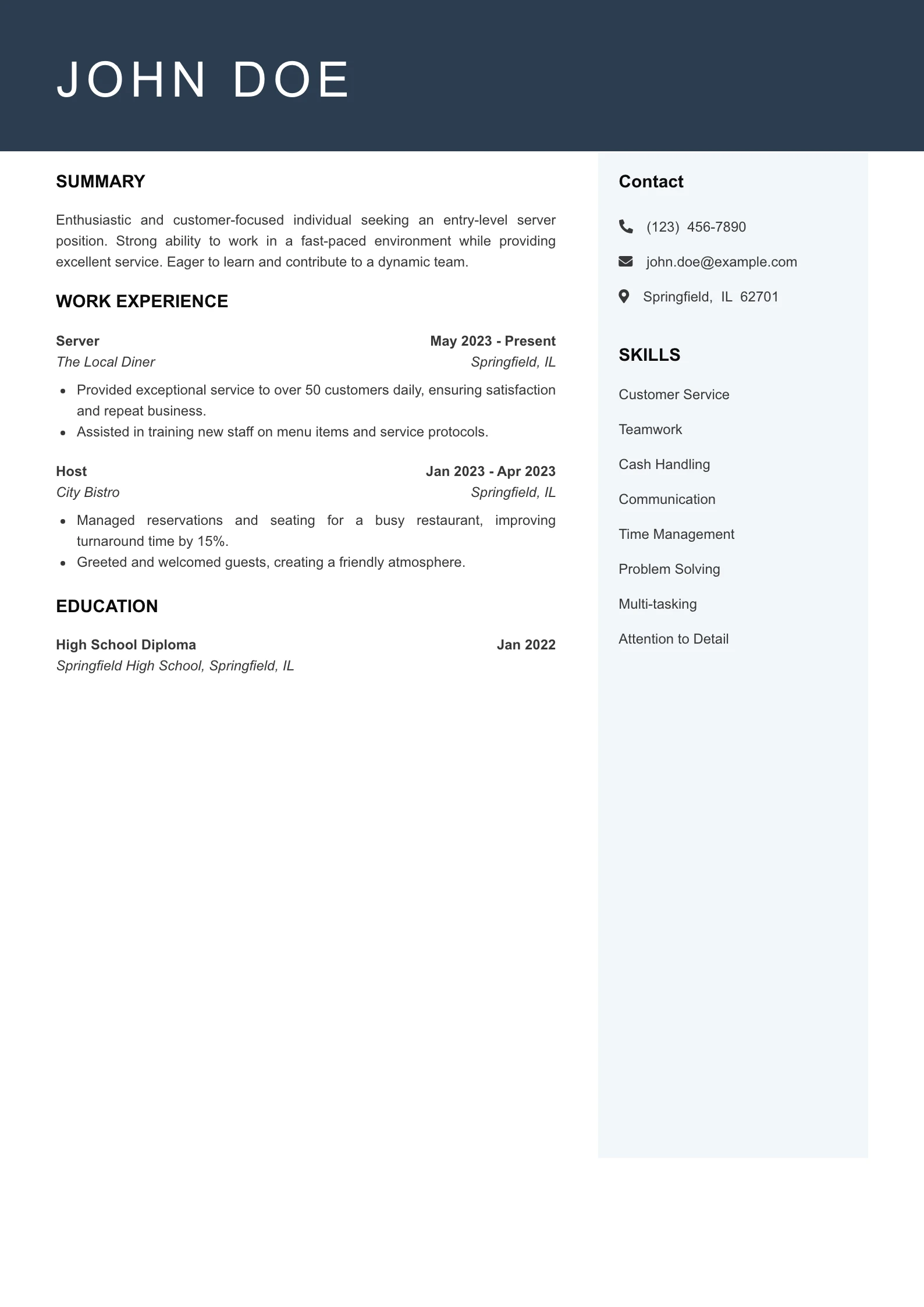
Why This Resume Works
- The resume opens with a clear and focused summary that effectively communicates John’s objective and customer-oriented mindset, aligning with the expectations for an entry-level server position.
- Relevant skills are well-listed, showcasing key competencies necessary for success in the hospitality industry, such as customer service, teamwork, and problem-solving.
- The work history highlights impactful contributions, such as serving a high volume of customers and improving operational efficiency, which indicates John’s ability to thrive in a fast-paced environment.
- The job fit is appropriate for an entry-level position, as the resume emphasizes foundational skills and experiences rather than advanced management or specialized expertise.
- The clarity and tone of the resume are professional and upbeat, encouraging a positive impression on potential employers while reflecting John’s eagerness to learn and grow in the role.
Mid Level Server Resume Example
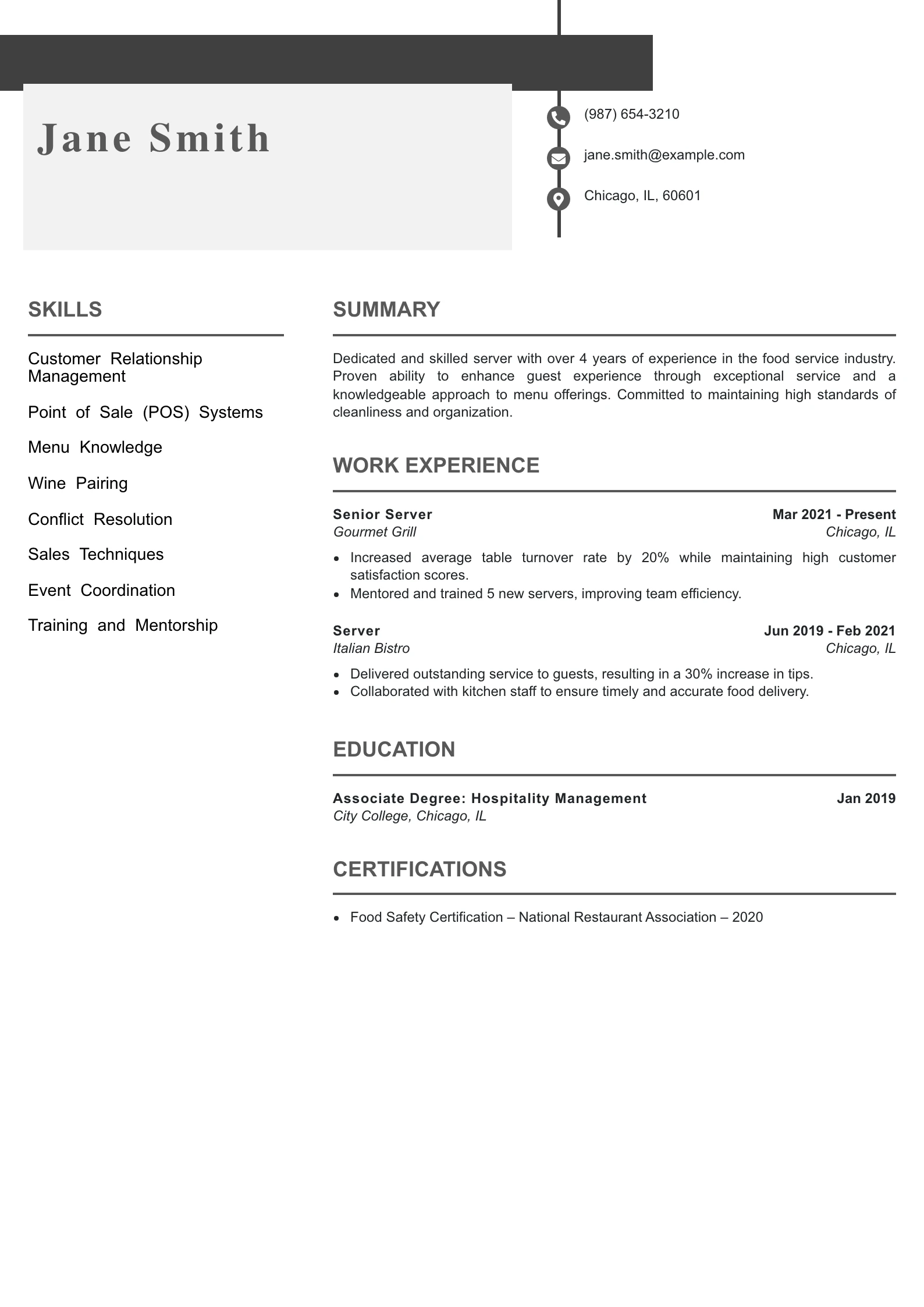
Why This Resume Works
- The summary effectively highlights Jane’s dedication and skills, clearly establishing her as an experienced server with a strong focus on guest experience and service excellence.
- Relevant skills listed are directly applicable to the hospitality industry, showcasing her proficiency in customer relationship management, conflict resolution, and training, which are crucial for a marketing manager role in a service-oriented environment.
- The work history demonstrates impactful contributions, such as increasing table turnover and improving team efficiency, indicating her ability to drive results and positively influence business performance.
- The resume reflects a mid-level job fit, showcasing growth from a server to a senior server, suggesting the potential for advancement and leadership in future roles.
- Clarity and tone are professional and concise, making it easy for hiring managers to quickly grasp her qualifications and achievements in the hospitality sector.
Senior Level Server Resume Example
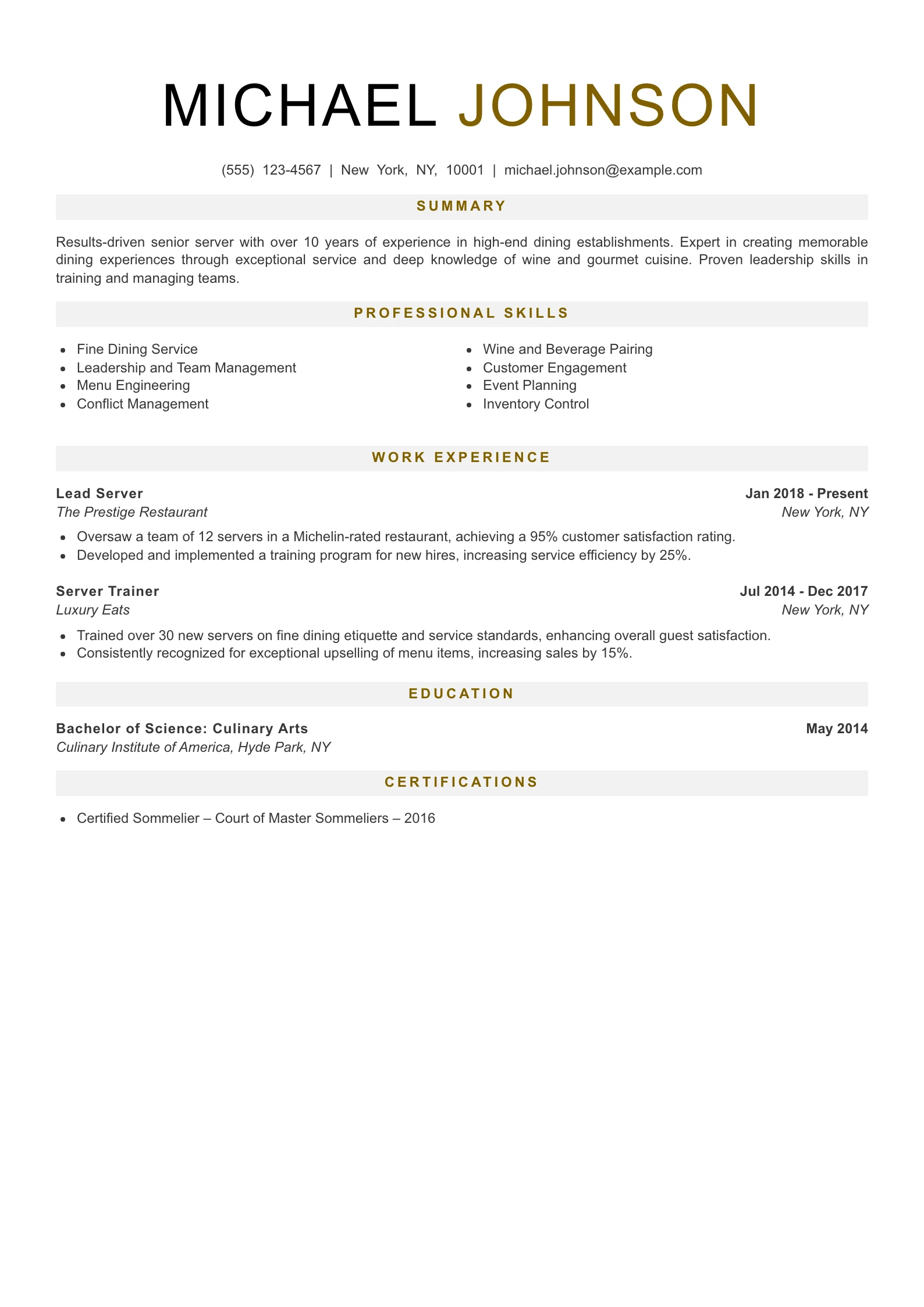
Why This Resume Works
- The summary clearly articulates Michael’s extensive experience and expertise in high-end dining, effectively positioning him as a strong candidate for a senior-level role in the hospitality industry.
- The skills section is comprehensive and directly relevant to the role, highlighting critical competencies such as leadership, customer engagement, and menu engineering that are essential for success in fine dining.
- The work history demonstrates impactful contributions, with quantifiable achievements like a 95% customer satisfaction rating and a 25% increase in service efficiency, showcasing his ability to drive results.
- The resume aligns well with a senior position, emphasizing leadership experience and a proven track record in training and managing teams, which is crucial for a management role.
- The clarity and professional tone throughout the resume convey a strong impression of competence and confidence, making it easy for hiring managers to assess Michael’s qualifications quickly.
How to Craft a Strong Server Resume
Creating a compelling resume is crucial for servers aiming to land their dream job in the hospitality industry. Hiring managers typically look for specific skills, experience, and the ability to provide excellent customer service. This guide will help you effectively highlight your strengths, ensuring your resume stands out among the competition.
Key Sections for a Server Resume
A typical server resume includes the following 5 sections.
- Resume Summary (2-3 sentences tailored to hospitality)
- Work Experience (restaurant, hotel, catering, customer service)
- Skills (hard + soft skills with hospitality focus)
- Education (high school diploma, food safety certifications)
- Optional Sections (languages, awards, volunteer work)
Next, we will go in details about these sections:
Resume Summary
A strong summary for a server resume provides a snapshot of your qualifications for the server job. Therefore, it should highlight your experience level, any specialization (like fine dining or casual service), key soft skills such as communication and teamwork, and hospitality skills. If you possess relevant certifications, such as food safety training, include them to enhance your profile.
A well-crafted summary can set the stage for the rest of your resume, engaging hiring managers right from the start.
Entry-Level:
Enthusiastic server with a passion for delivering outstanding customer service in busy environments. Eager to leverage strong communication skills and a positive attitude to enhance guest experiences.
Mid-Level:
Dedicated server with over 5 years of experience in high-volume restaurants, specializing in fine dining and exceptional customer service. Proven ability to increase sales and customer satisfaction through attentive and personalized service.
Skills & Qualifications
When building your skills section, highlight a mix of technical abilities and soft skills that make you effective as a server. Technical skills can include food safety knowledge, POS system proficiency, and cash handling, while soft skills cover communication, teamwork, and problem-solving.
To choose the right skills, review job postings and note the qualifications employers emphasize. Align your list with those requirements and format it in an ATS-friendly way so it passes screening while appealing to hiring managers.
- Customer service excellence
- Food safety knowledge
- POS system proficiency
- Multitasking abilities
- Effective communication
- Team collaboration
- Conflict resolution
- Time management
Top ATS Keywords for Server
| Server Resume Skill | Demand in Job Postings |
|---|---|
| Customer Service | 184 |
| Food Safety | 161 |
| Teamwork | 138 |
| Communication Skills | 115 |
| Cash Handling | 92 |
| Menu Knowledge | 92 |
| Multitasking | 69 |
| POS Systems | 69 |
| Time Management | 46 |
| Problem-Solving | 46 |
Work History
In your work history section, emphasize your relevant experience and achievements. Highlight aspects like customer satisfaction, sales metrics, or your role in team leadership, depending on your level of experience. Use bullet points to make your accomplishments clear and quantify them when possible, as numbers often speak louder than words.
For formatting, adopt a reverse-chronological layout to showcase your most recent roles first. This structure allows employers to quickly see your career progression and most pertinent experiences.
Entry-Level:
Server, Joe’s Diner, Cityville, CA, Jan 2023 – Present
– Greet and serve customers in a fast-paced environment
– Assist in maintaining cleanliness and organization of dining areas
– Collaborate with team members to ensure efficient service
Mid-Level:
Lead Server, The Gourmet Bistro, Townsville, TX, June 2018 – Dec 2022
– Managed a team of servers in a high-end dining setting
– Increased customer satisfaction scores by 20% through exceptional service
– Trained new hires on menu knowledge and customer engagement techniques
Ready to Land Your Next Job?
Don’t let your resume get lost in the stack. Build a professional, ATS-friendly resume that highlights your leadership, achievements, and industry expertise.
Education
Although a formal degree is not always required for server roles, including relevant training or certifications can strengthen your resume. Many servers list a high school diploma, while others highlight coursework or degrees in hospitality, culinary arts, or related fields.
When adding your education section, keep it clear and concise: include the degree or certification, the institution’s name, its location, and your graduation year. This straightforward format makes it easy for hiring managers — and ATS systems — to quickly recognize your qualifications.
Degree, School Name, City, State, Graduation Year
Example:
Diploma in Hospitality Management, Culinary Institute of America, Hyde Park, NY, 2020
Additional Sections
To make your server resume stand out, consider adding optional sections that highlight unique strengths. Certifications in areas such as food handling, wine service, or customer service can set you apart from other candidates. Likewise, listing multilingual abilities can be a strong advantage in diverse dining environments.
When listing certifications, follow a clear and consistent format:
– Certification Name – Issuing Organization – Year
Here are examples of such certifications to consider:
Certification:
ServeSafe Food Handler Certification – National Restaurant Association – 2022
TIPS Alcohol Certification – 2021
Do’s and Don’ts
Keep these tips in mind to make your resume both ATS-friendly and appealing to hiring managers:
Do:
- Use relevant keywords from job descriptions so your resume passes ATS screening.
- Highlight measurable achievements (e.g., “Increased upselling revenue by 15%”).
- Incorporate hospitality-specific terms such as POS systems, food safety, customer service.
Don’t:
- Use vague or generic statements like “hard worker” or “team player” without proof.
- Overlook soft skills — communication and teamwork are critical in hospitality roles.
- Overload your resume with buzzwords or filler phrases that don’t show real impact.
Sample Resume — Restaurant Server
Maria Lopez
Chicago, IL | (555) 229-7788 | maria.lopez@email.com | LinkedIn: linkedin.com/in/marialopez
Professional Summary
Friendly and customer-focused Restaurant Server with 4+ years of experience providing high-quality service in busy dining environments. Skilled in order accuracy, upselling menu items, and handling cash/POS transactions. Recognized for maintaining excellent customer satisfaction scores and working efficiently in both casual and high-volume restaurants.
Core Skills
- Order Taking & Food Service
- Customer Service & Complaint Resolution
- POS Systems & Cash Handling
- Menu Knowledge & Upselling
- Food Safety & Sanitation (ServSafe Certified)
- Table Setting & Dining Etiquette
- Team Collaboration & Communication
- Multitasking in Fast-Paced Environments
Professional Experience
Restaurant Server
La Vida Bistro, Chicago, IL
August 2020 – Present
- Provide table service to 100+ guests daily in a fast-paced casual dining restaurant.
- Upsold appetizers, desserts, and beverages, contributing to a 15% increase in average check size.
- Handled cash, credit, and mobile payments with 100% accuracy.
- Resolved customer complaints quickly and professionally, maintaining a 95% customer satisfaction rating.
- Trained 3 new servers on restaurant procedures and customer engagement techniques.
Server Assistant → Server
Urban Eats Café, Chicago, IL
June 2018 – July 2020
- Supported waitstaff by refilling drinks, clearing tables, and resetting for new guests.
- Promoted to full server role after 6 months due to excellent customer service performance.
- Memorized full menu and daily specials to answer customer questions accurately.
- Collaborated with kitchen staff to ensure timely and accurate food delivery.
Education
High School Diploma
Lane Tech High School — Chicago, IL
Graduated: 2017
Certifications
- ServSafe Food Handler Certification
- Alcohol Server Permit (BASSET, Illinois)
Additional Activities
- Volunteer Server, Community Food Kitchen.
- Member, Illinois Restaurant Association.
Sample Resume — Fine Dining Server
Maria Lopez
Chicago, IL | (555) 229-7788 | maria.lopez@email.com | LinkedIn: linkedin.com/in/marialopez
Professional Summary
Friendly and customer-focused Restaurant Server with 4+ years of experience providing high-quality service in busy dining environments. Skilled in order accuracy, upselling menu items, and handling cash/POS transactions. Recognized for maintaining excellent customer satisfaction scores and working efficiently in both casual and high-volume restaurants.
Core Skills
- Order Taking & Food Service
- Customer Service & Complaint Resolution
- POS Systems & Cash Handling
- Menu Knowledge & Upselling
- Food Safety & Sanitation (ServSafe Certified)
- Table Setting & Dining Etiquette
- Team Collaboration & Communication
- Multitasking in Fast-Paced Environments
Professional Experience
Restaurant Server
La Vida Bistro, Chicago, IL
August 2020 – Present
- Provide table service to 100+ guests daily in a fast-paced casual dining restaurant.
- Upsold appetizers, desserts, and beverages, contributing to a 15% increase in average check size.
- Handled cash, credit, and mobile payments with 100% accuracy.
- Resolved customer complaints quickly and professionally, maintaining a 95% customer satisfaction rating.
- Trained 3 new servers on restaurant procedures and customer engagement techniques.
Server Assistant → Server
Urban Eats Café, Chicago, IL
June 2018 – July 2020
- Supported waitstaff by refilling drinks, clearing tables, and resetting for new guests.
- Promoted to full server role after 6 months due to excellent customer service performance.
- Memorized full menu and daily specials to answer customer questions accurately.
- Collaborated with kitchen staff to ensure timely and accurate food delivery.
Education
High School Diploma
Lane Tech High School — Chicago, IL
Graduated: 2017
Certifications
- ServSafe Food Handler Certification
- Alcohol Server Permit (BASSET, Illinois)
Additional Activities
- Volunteer Server, Community Food Kitchen.
- Member, Illinois Restaurant Association.
Sample Resume — Banquet Server
Taylor Simmons
Las Vegas, NV | (555) 672-8844 | taylor.simmons@email.com | LinkedIn: linkedin.com/in/taylorsimmons
Professional Summary
Energetic and reliable Banquet Server with 4+ years of experience providing exceptional service at weddings, corporate functions, and large-scale catered events. Skilled in banquet setup, multi-course food service, and beverage handling for groups of 50 to 500+. Known for attention to detail, ability to multitask in high-pressure environments, and professionalism when interacting with diverse guests.
Core Skills
- Banquet Setup & Breakdown
- Multi-Table Service for Large Events
- Food & Beverage Presentation
- Buffet & Plated Service Styles
- Team Collaboration with Catering & Kitchen Staff
- Guest Service & Complaint Resolution
- Time Management in Fast-Paced Events
- Cash Handling & POS Transactions (when required)
- Health & Safety Compliance
Professional Experience
Banquet Server
The Grand Hotel & Conference Center, Las Vegas, NV
August 2019 – Present
- Serve large events with 100–500+ guests, ensuring timely and accurate food and beverage service.
- Assisted in banquet setup and takedown, including table arrangements, décor, and AV support.
- Delivered plated meals and managed beverage orders while maintaining high guest satisfaction.
- Collaborated with catering managers and chefs to execute event plans flawlessly.
- Recognized with “Employee of the Month” in 2021 for exceptional teamwork and guest service.
Catering Server / Event Staff
Silver Spoon Catering, Las Vegas, NV
June 2017 – July 2019
- Assisted in serving food and beverages for weddings, parties, and corporate functions.
- Managed buffet lines, replenished food trays, and maintained cleanliness throughout events.
- Provided courteous guest service, handling special dietary requests.
- Supported bartenders with beverage delivery and setup.
Education
High School Diploma
Las Vegas High School — Las Vegas, NV
Graduated: 2016
Certifications
- ServSafe Food Handler Certification
- TIPS Alcohol Certification
Additional Activities
- Volunteer Banquet Server, Local Community Fundraising Gala.
- Member, National Association for Catering & Events (NACE).
Sample Resume — Catering Server
Alexandra Ruiz
Miami, FL | (555) 229-6712 | alexandra.ruiz@email.com | LinkedIn: linkedin.com/in/alexandraruiz
Professional Summary
Dependable and detail-oriented Catering Server with 5+ years of experience supporting weddings, corporate functions, and private parties. Skilled in buffet and plated service, event setup/breakdown, and guest interaction. Recognized for professionalism, efficiency, and adaptability in fast-paced environments. Dedicated to ensuring smooth catering operations and a positive guest experience.
Core Skills
- Event Setup & Takedown
- Buffet & Plated Meal Service
- Food & Beverage Handling
- Guest Service & Complaint Resolution
- Multi-Table / Large Group Service
- Coordination with Event Planners & Catering Staff
- Food Safety & Sanitation (ServSafe Certified)
- Time Management & Teamwork
- Adaptability to Venue Requirements
Professional Experience
Catering Server
Premier Catering Services, Miami, FL
September 2019 – Present
- Supported 150+ catered events annually, serving groups from 50 to 600 guests.
- Assisted in setup, including tables, linens, buffet stations, and décor.
- Delivered buffet and plated meals efficiently while maintaining excellent guest service.
- Worked closely with event planners and catering managers to ensure client satisfaction.
- Trained 6 new catering staff on service procedures and event safety protocols.
Event Server
Miami Party Catering, Miami, FL
July 2016 – August 2019
- Served food and beverages at weddings, galas, and private events.
- Maintained cleanliness of service areas and replenished buffet stations.
- Assisted bartenders with drink delivery during peak event hours.
- Provided support with venue setup and teardown.
Education
High School Diploma
Miami Central High School — Miami, FL
Graduated: 2015
Certifications
- ServSafe Food Handler Certification
- TIPS Alcohol Certification
Additional Activities
- Volunteer Catering Server, Local Charity Fundraising Dinners.
- Member, National Association for Catering & Events (NACE).
Sample Resume — Cocktail Server
Vanessa Brooks
Las Vegas, NV | (555) 902-3344 | vanessa.brooks@email.com | LinkedIn: linkedin.com/in/vanessabrooks
Professional Summary
Energetic and customer-focused Cocktail Server with 4+ years of experience providing fast, friendly beverage service in high-volume casinos and lounges. Skilled in upselling specialty drinks, managing multiple tables, and delivering VIP-level service. Known for excellent multitasking, strong product knowledge, and consistently exceeding sales and service goals.
Core Skills
- Cocktail & Beverage Service
- Upselling & Suggestive Selling
- High-Volume Table Management
- VIP & Bottle Service
- POS Systems & Cash Handling
- Food & Beverage Pairing
- Customer Service & Complaint Resolution
- Team Collaboration with Bartenders & Security
- Health & Alcohol Safety Compliance (TIPS Certified)
Professional Experience
Cocktail Server
Golden Palace Casino, Las Vegas, NV
September 2019 – Present
- Serve 200+ patrons nightly in a high-energy casino lounge environment.
- Upsell specialty cocktails and bottle service, increasing personal sales revenue by 18% annually.
- Manage 8–10 tables per shift while maintaining excellent customer service standards.
- Collaborate with bartenders to ensure accurate and timely drink delivery.
- Consistently recognized as one of the top-selling servers in the venue.
Server / Cocktail Waitress
Sunset Bar & Lounge, Las Vegas, NV
July 2017 – August 2019
- Provided cocktail service in a busy nightclub with live entertainment.
- Memorized 30+ specialty cocktails and seasonal drink menus.
- Delivered VIP bottle service for private tables and events.
- Trained 4 new servers in drink menu knowledge and upselling strategies.
Education
High School Diploma
Las Vegas High School — Las Vegas, NV
Graduated: 2016
Certifications
- TIPS Alcohol Certification (Training for Intervention Procedures)
- ServSafe Food Handler Certification
Additional Activities
- Volunteer Server, Charity Casino Nights.
- Member, National Bartenders Association (NBA).
Sample Resume — Hotel Server
Daniel Foster
Orlando, FL | (555) 448-9011 | daniel.foster@email.com | LinkedIn: linkedin.com/in/danielfoster
Professional Summary
Attentive and professional Hotel Server with 5+ years of experience providing food and beverage service in hotel restaurants, lounges, and room service. Skilled in upselling hotel amenities, managing multi-table service, and ensuring excellent guest satisfaction. Adept at working in high-volume hospitality environments while maintaining luxury service standards.
Core Skills
- Restaurant, Lounge & Room Service
- Upselling Hotel Amenities (dining, spa, events)
- POS Systems & Cash Handling
- Multi-Table Management
- Guest Service & Complaint Resolution
- Banquet & Conference Service Support
- Food Safety & Sanitation Standards
- Collaboration with Front Desk, Housekeeping & Concierge
- Team Training & Shift Support
Professional Experience
Hotel Server
Grand Vista Resort & Spa, Orlando, FL
August 2019 – Present
- Provide restaurant, lounge, and room service to 200+ hotel guests daily.
- Upsold hotel amenities (wine packages, spa treatments, tours), contributing to a 12% increase in revenue.
- Supported banquet events and conferences, serving groups of 50–300 guests.
- Delivered personalized service to VIP and repeat guests, ensuring high satisfaction ratings.
- Trained 5 new servers on hotel service standards and upselling techniques.
Restaurant Server
Sunset Hotel & Suites, Orlando, FL
July 2016 – July 2019
- Managed 6–8 tables per shift in the hotel restaurant.
- Processed guest orders, handled POS transactions, and coordinated with kitchen staff.
- Assisted with room service deliveries and special guest requests.
- Collaborated with front desk team to accommodate dietary preferences for international guests.
Education
Associate Degree in Hospitality Management
Valencia College — Orlando, FL
Graduated: 2016
Certifications
- ServSafe Food Handler Certification
- TIPS Alcohol Certification
Additional Activities
- Volunteer, Local Tourism Hospitality Events.
- Member, Hospitality Professionals Association (HPA).
Sample Resume — Server Trainer
Allison Rivera
Houston, TX | (555) 776-2290 | allison.rivera@email.com | LinkedIn: linkedin.com/in/allisonrivera
Professional Summary
Experienced Server Trainer with 6+ years of restaurant and hospitality experience, including 3 years training and mentoring new staff. Skilled in onboarding, developing training manuals, and ensuring consistency in customer service and dining standards. Recognized for improving server performance, reducing turnover, and maintaining high guest satisfaction scores.
Core Skills
- Staff Training & Onboarding
- Table Service & Guest Experience
- Training Manual & SOP Development
- Food Safety & Sanitation (ServSafe Certified)
- POS Systems & Payment Processing
- Team Leadership & Mentorship
- Upselling & Customer Engagement
- Conflict Resolution & Problem-Solving
- Performance Evaluation & Feedback
Professional Experience
Server Trainer / Senior Server
Bayou Grill & Steakhouse, Houston, TX
August 2019 – Present
- Trained 20+ new servers on restaurant procedures, menu knowledge, and customer service standards.
- Created a training guide that reduced onboarding time by 25%.
- Conducted side-by-side coaching during first shifts to build confidence and consistency.
- Continued to serve 50+ guests daily while supporting management with shift leadership.
- Recognized as “Trainer of the Quarter” in 2022 for outstanding mentorship.
Restaurant Server
Gulf Breeze Dining, Houston, TX
June 2016 – July 2019
- Delivered excellent food and beverage service in a busy casual dining environment.
- Consistently exceeded upselling targets, increasing average check size by 10%.
- Supported new hires by demonstrating proper service techniques and customer engagement.
- Maintained top performance metrics for guest satisfaction and table turnover efficiency.
Education
High School Diploma
Houston High School — Houston, TX
Graduated: 2015
Certifications
- ServSafe Food Handler Certification
- TIPS Alcohol Certification
Additional Activities
- Volunteer Trainer, Hospitality Workforce Development Program.
- Member, National Restaurant Association.
Sample Resume — Server Supervisor / Lead Server
Christopher Nguyen
Los Angeles, CA | (555) 908-2214 | christopher.nguyen@email.com | LinkedIn: linkedin.com/in/christophernguyen
Professional Summary
Reliable and team-oriented Lead Server / Server Supervisor with 7+ years of experience in high-volume restaurants. Skilled in supervising and mentoring server teams, handling escalated guest concerns, and ensuring smooth shift operations. Adept at balancing hands-on service with leadership responsibilities to maintain high standards of dining service and guest satisfaction.
Core Skills
- Team Supervision & Shift Leadership
- Staff Training & Mentorship
- Guest Service & Complaint Resolution
- Scheduling & Floor Coordination
- POS Systems & Cash Handling
- Food Safety & Sanitation Standards (ServSafe)
- Upselling & Sales Support
- Collaboration with Kitchen & Management
- Performance Monitoring & Feedback
Professional Experience
Lead Server / Server Supervisor
Pacific Grill, Los Angeles, CA
September 2019 – Present
- Supervise a team of 15 servers in a high-volume casual dining restaurant.
- Coordinate floor assignments, table rotations, and shift schedules.
- Handle escalated guest issues, resolving complaints and maintaining a 97% guest satisfaction rating.
- Train and mentor new hires, reducing turnover by 20% in two years.
- Support restaurant managers with opening/closing duties and daily cash reconciliation.
Senior Server
Sunset Bistro, Los Angeles, CA
July 2016 – August 2019
- Managed high-traffic sections during peak service, averaging 12–15 tables.
- Assisted supervisors in onboarding and coaching new servers.
- Consistently exceeded upselling targets, contributing to a 10% increase in beverage sales.
- Recognized as “Server of the Year” in 2018 for performance and leadership.
Education
High School Diploma
Los Angeles High School — Los Angeles, CA
Graduated: 2014
Certifications
- ServSafe Food Handler Certification
- TIPS Alcohol Certification
Additional Activities
- Volunteer Shift Leader, Community Food Bank Events.
- Member, California Restaurant Association (CRA).

